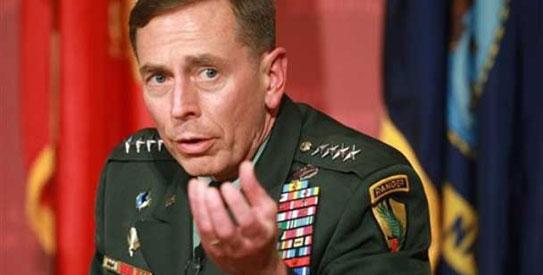
FORWARD OPERATING BASE SALERNO, Afghanistan: The top US and Nato commander in Afghanistan said there will be more coordinated military operations on either side of the Afghanistan-Pakistan border, and commended Pakistan on its "impressive" counterinsurgency efforts.
The Taliban in Afghanistan and other extremist groups use safe havens across the border in Pakistan, and the US has been pushing Islamabad to clear the lawless tribal belt that runs along the frontier. The pressure has often strained US-Pakistani relations, with Islamabad bristling at suggestions it should do more.
Gen. David Petraeus, who took over command of coalition troops in Afghanistan in July, told The Associated Press there had already been coordinated operations on both sides of the border, with Pakistani forces on one side and NATO and Afghan troops on the other.
"We want to do more hammer and anvil operations," Petraeus said late Saturday, in an interview aboard a military transport aircraft as he flew around the country on Christmas visits to bases and combat outposts dotted across north, west, south and east Afghanistan.
Pakistan recognized "the need to do more to solidify their gains in (Pakistan's Federally Administered Tribal Areas), and we are going to coordinate with them to help their operations," he said.
But the general insisted that Pakistan's efforts at combating the various militant groups active in the country must be commended.
"We have to be very clear in recognising what Pakistan has done over the course of the last 22 months, which is quite considerable. They've conducted impressive counterinsurgency operations" in several regions, including the Swat Valley, the North West Frontier Province and the tribal regions, Petraeus said.
"And they have sustained significant military losses and civilian losses during the course of that time."
Petraeus insisted that gains already made must be solidified before Pakistan expands its operations to other areas - such as troubled North Waziristan.
"They are the first to recognise that there are groups in there that have to be dealt with over time," the general said, sitting at the desk of an office set up inside the military plane, laptops keeping him connected to operations across the country.
"But ... they've got quite a few short sticks and hornets' nests already, and rule Number 1 of a military operation is don't start something you can't finish. And they recognise the need to finish some of the operations they've already conducted before launching significant new ones."
The Pakistani military has stepped up operations against extremist groups it considers a threat to its own security - notably the Pakistani Taliban.
Forces in Pakistan and Afghanistan "have conducted very close coordination in the past two months in particular," the general said, adding that he meets regularly with Pakistani army chief Gen. Ashfaq Parvez Kayani, with two meetings held already this month, one in Kabul and the other in Islamabad.
"All participants recognize the need to do more against some of those elements that are undermining security in Afghanistan. And again, over time, as earlier gains are solidified we think there will be opportunities for coordinated activities,'' he said.
Much of the fiercest fighting in Afghanistan has been concentrated in the Taliban's traditional southern strongholds. An internal review of President Barack Obama's year-old war strategy released recently noted progress against the Taliban in the south, where the US deployed an additional 30,000 American troops this year.
But the Taliban have been showing their reach, increasing attacks in other parts of the country through the year. Residents say parts of the north that were once quiet are now under Taliban control, with Afghan security forces often confined to their compounds, especially at night.
"Over the last two years there has been an increase in Taliban activity up in the north," Petraeus acknowledged, but said there were plans by the Interior Ministry, the Afghan army and Nato "to reverse the momentum that the Taliban achieved in the north."
Asked how this would be done, the general pointed to recent operations in the northern province of Kunduz, where combined operations involving the Afghan army, police, border police and coalition forces were pushing further into territory where the Taliban operate.











































Dear visitor, the comments section is undergoing an overhaul and will return soon.